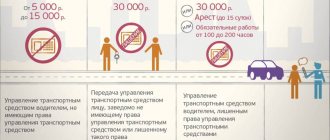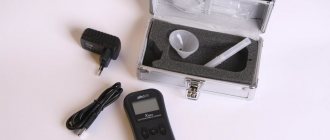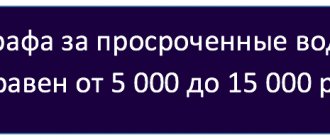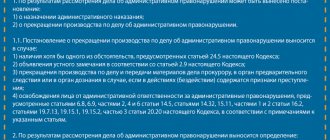Home/Deprivation of a driver's license/Deprivation of a driver's license for non-payment of child support in 2021
It is not uncommon for a former spouse to refuse to financially support their minor children who are left in the care of only one parent. The state seeks to influence such malicious alimony debtors by applying various measures and constantly expanding their list.
Attention
In 2021, there is an opportunity to motivate the child support worker - if he has a large debt, he may lose the right to drive a vehicle!
Can a driver's license be revoked for failure to pay child support?
Yes, since the entry into force of Federal Law No. 340-FZ, this is a fact - now you can actually lose your driver’s license for non-payment of alimony. This procedure is initiated by an appropriate executive document, for example, a corresponding court decision. This is a kind of license for a bailiff, who begins to act on the basis of this paper.
Attention! If you have any questions, you can chat for free with a lawyer at the bottom of the screen or call Moscow; Saint Petersburg; Free call for all of Russia.
Conditions for deprivation of a driver's license for non-payment of alimony in 2021
Art. 67.1 of Federal Law No. 229 provides for the following factors influencing the decision on the need to deprive an alimony debtor of a driver’s license in 2021:
- The amount of alimony debt is 10 thousand rubles (Article 1, Clause 4 of the Federal Law - No. 340).
- This is a threshold level; if the debt is less, the driver’s license will not be confiscated.
- The alimony payer deliberately refuses his obligations, that is, he is aware of the existence of the debt, and at the same time he does not have any valid reasons for allowing it (neither illness nor financial difficulties).
Conditions allowing the debtor to be deprived of his driving privileges
The possibility of revoking a driver's license arises in the following circumstances:
- The court made a decision to collect the debt from the defendant.
- The total amount of debt is at least 10,000 rubles. When determining it, other unpaid obligations are also taken into account - those imposed for violating traffic rules or other legal norms. That is, if they exist, an administrative measure can be applied even if the debt for alimony does not reach the required limit. The period of non-payment is not taken into account.
- This situation does not belong to those mentioned by law, in which the application of these measures would be unacceptable.
Who cannot have their driver's license revoked?
Not every child support debtor can have their driver's license revoked in 2021. If he meets the following conditions, then he need not fear for his document:
- the amount of alimony debt is not higher than the threshold of 10 thousand rubles;
- a deferment or installment plan has been officially granted to repay the debt;
- the main activity from which he receives income is impossible without driving a vehicle (for example, a child support worker works as a taxi driver or is engaged in cargo transportation);
- the debtor’s car is the only way of transportation on which his life depends (for example, the child support worker lives in a remote area where the transport infrastructure is not developed);
- the debtor is disabled;
- supports a disabled person, whom he transports in his vehicle to places of treatment;
- is wanted, so it is not possible to serve him with a restrictive order.
To confirm the fact that the alimony worker cannot be confiscated in 2021, he must have the appropriate documents with him, for example:
- a bailiff's certificate confirming the amount of debt;
- court order to defer or installment plan;
- certificate of his disability.
What is needed for the application
To deprive a persistent non-payer of alimony of his rights, it is necessary to write a statement.
It will require you to provide some information:
- personal information of the applicant;
- grounds for deprivation of vu;
- date of;
- information from the FSSP about the existence of alimony debts;
- signature.
You can make an application in free form and there is no special format. But at the same time, a single standard of office work norms must be observed, so you should first familiarize yourself with the information on specialized websites, where you will probably find a corresponding sample application with explanations.
Normative base
Federal Law No. 340-FZ made significant changes to various legislative acts, including the law on enforcement proceedings. Among other things, these amendments expanded the list of actions that a bailiff is authorized to perform to influence a debtor in 2021. Now they can restrict the debtor’s right to drive vehicles (not only cars, but also motorcycles, mopeds, quadricycles, etc.).
Among other regulations, this law introduced amendments to Art. 67.1 of Federal Law No. 229-FZ, which discloses temporary restrictions on the debtor’s use of the right to drive a car.
Algorithm for restoring special rights
Having lost the right to drive vehicles, the debtor wonders what to do if the bailiffs seized the license for alimony, and what to do to get it back.
The alimony payer will be able to get back his driver's license and, as a result, restore his right to drive vehicles only after full compensation of the arrears of alimony payments and penalties accrued for late payments.
If the procedure for confiscation of a driver's license was initiated at the FSSP, an additional enforcement fee in the amount of 7% of the debt amount must be paid.
The alimony payer is obliged to confirm the fact of payment of the debt by providing documentary evidence to the bailiff. Such confirmation may include:
- a notarized receipt of receipt of funds or personally written by the claimant in the presence of a bailiff (if we are talking about cash);
- bank statement confirming the transfer of funds to the recipient's account;
- copies of receipts for payment to the treasury (in the case where debts on alimony payments are reimbursed to the plaintiff by the state).
Having received documents indicating the repayment of the debt, the bailiff conducts an inspection within 24 hours. After this, he makes a decision to lift the ban on driving vehicles and issues the payer a driver’s license according to the acceptance certificate. A copy is given to the defendant and sent to the traffic police for deregistration.
Procedure for depriving a driver's license for non-payment of child support
The law amending the procedure for influencing debtors gave bailiffs the right to initiate a procedure for depriving a driver’s license without first going to court. To apply such a measure of influence there must be grounds:
- the relevant writ of execution;
- presence of large debt.
The procedure for depriving a driver’s license for failure to pay child support in 2021 involves the following steps:
- Sending a written notice to the debtor, where he is invited to voluntarily repay the debt within 5 days from the date of receipt of this document. Otherwise, administrative measures will be taken against the alimony provider.
- If, after this period, the debt remains with the payer, the bailiff issues a decision to bring the debtor to the promised administrative liability. He sends copies of the resolution to the following persons: - the payer; - the recipient of alimony; - the traffic police authority, which enters the information received into the database.
- Now the alimony debtor is deprived of the right to drive a vehicle, even if he has a driver’s license in his hands.
Please note:
The procedure for depriving a driver's license becomes more complicated if the debtor is located in one city and the recipient is in another. Since the powers of the bailiff are limited geographically, and the recipient addresses him at his place of residence, it is necessary to redirect the case to the place of residence of the payer.
If the bailiff is in no hurry to apply this measure of influence, the recipient of alimony can motivate him. In 2021, you need to act as follows:
- Come to the territorial office of the FSSP strictly on the reception day. It is important to find out in advance what hours the bailiff receives private individuals, since he may refuse to speak at odd hours or simply be absent.
- Orally explain the situation to the bailiff, present evidence (for example, a bank statement from your personal account, which shows the absence of financial contributions from your ex-spouse).
- Submit a written application to hold the alimony provider accountable in accordance with Art. 67.1 No. 229-FZ.
- The bailiff is given 10 days to consider the application and take measures to implement it.
- Make a follow-up visit a few days later to inquire about the progress of your case.
If, immediately after the divorce, the former spouses entered into a voluntary agreement on the payment of alimony in the presence of a notary, this means that the bailiff cannot have in his hands a writ of execution ordering mandatory payments. In this case, the recipient demanding repayment of the debt must apply directly to the court with a statement of claim or entrust this to the bailiff by first visiting him.
Returning the ID
In accordance with the bill of the Russian Federation, the arrest or suspension of a driver’s license, as well as its further renewal, is carried out within 24 hours from the moment the citizen pays the state debt. To do this, it is enough to submit an application to the judicial authorities and attach all the necessary receipts to it. Within 24 hours, the bailiffs will check the information received and transmit new information about the driver to the traffic police.
But, of course, it is advisable not to go to extremes and pay bills on time. And then you will not face deprivation of rights for debts. In the event of an unlawful arrest, you should immediately contact legal consultants, since rarely does anyone succeed in appealing such a decision in court on their own.
Sample application for deprivation of a driver's license for failure to pay child support
An application addressed to a bailiff from a recipient of alimony in 2021 must contain the following parts:
- “Header” is a block located in the upper right corner of the sheet and containing the following parts: - position and full name of the addressee; -full name, registration address and contact details of the applicant.
- Title: “PETITION FOR LIMITATION OF THE USE OF THE DEBTOR’S SPECIAL RIGHT.”
- Introduction, which reports the presence of a large alimony debt, the volume of which has exceeded the threshold.
- The request block, which begins as follows: “In accordance with the above, and also on the basis of Art. 67.1 of Federal Law No. 229-FZ I ASK: ". Below is a list of the measures that, in the opinion of the applicant, should be applied to the debtor: - hold him accountable in the form of deprivation of the right to drive a vehicle; -notify the applicant of the measures taken by sending a copy of the decision.
- Date of preparation.
- Signature and transcript.
Applications addressed to the bailiff for deprivation of alimony.
A statement of claim filed with the court in 2021 must contain the following elements:
- “Hat” : a block in the upper right corner with the following components: -addressee: court (you must indicate its full name and address); -plaintiff: here the applicant indicates his full name, contact details and registration address; -respondent: the full name of the debtor and his registration address (if there is a telephone number to which he answers, this must also be indicated).
- Title : “STATEMENT OF CLAIM FOR TEMPORARY LIMITATION OF THE USE OF SPECIAL RIGHTS BY THE DEBTOR.”
- Introduction , where the following information is indicated: - Information about marriage and divorce. - Information about the minor child (or children) for whose maintenance alimony is required. -Information about the conclusion of a notarial voluntary agreement (you must indicate the date of conclusion; the amount agreed upon by the parties; payment deadline). -Description of the situation that the ex-spouse has stopped paying alimony and has accumulated a debt that exceeds the threshold level. - Statement of the request to the court. Here is a statement of the expected result from the trial: a temporary restriction of the debtor’s right to drive vehicles for the period until he fully repays the existing debt.
- List of attachments : -copy of your passport; -copy of the child’s birth certificate; -copy of marriage certificate; -a copy of the divorce certificate; - a copy of the concluded agreement on alimony; -bank statement confirming the termination of cash receipts.
- Date of preparation.
- Signature and decryption.
statement of claim for deprivation of the child support worker's driver's license.
Under what circumstances is deprivation made?
It was already said earlier that for evading a loan and alimony, a citizen can be deprived of a driver’s license or have its validity temporarily suspended. But in accordance with the decision of the State Duma, such punishment must be applied under the following mandatory conditions:
- Sanctions in the form of confiscation of the certificate were imposed by the court, as evidenced by the writ of execution;
- A citizen’s credit or alimony debt is more than 10 thousand rubles;
- The draft dodger does not belong to the category of persons to whom the imposition of such restrictions does not apply.
If any of the listed points occurs, then proceedings should be initiated against such a person using other legal levers of pressure (restriction of freedom or forced labor).
Can they deprive their ED for non-payment of alimony without the knowledge of the debtor?
The alimony debtor will definitely be aware of the decree limiting his right to drive vehicles. The law prescribes the need to inform both the payer and the recipient of alimony about this. If the payer believes that his rights cannot be taken away because his life circumstances are covered by law, he informs the bailiffs about this in writing.
Attention
If it is impossible to find out the current location of the debtor, then it cannot be limited in the driver’s license precisely for the reason that the payer must be personally notified of this decision. Therefore, if a bailiff or alimony collector wants to apply just such a measure of influence to him, first he is put on the executive wanted list.
Administrative liability provided for failure to comply with regulations
Failure to comply with court decisions and orders of bailiffs can lead to serious consequences for the debtor. If he ignored the demands of the bailiff, on the basis of Art. 17.14 Part 1 of the Code of Administrative Offenses of the Russian Federation, penalties may be applied to him in the form of collection of amounts in the amount of:
- for individuals – from 1,000 to 2,500 rubles;
- for individual entrepreneurs – from 10,000 rubles.
In the event that these measures do not have an effect on the offender and he does not surrender his driver’s license, continues to drive vehicles, and also still does not pay off arrears in alimony payments, more stringent measures may be applied to him. In particular, the debtor may be subject to administrative penalties in the form of:
- imposing a fine of up to 30,000 rubles;
- detention for up to 15 days;
- correctional labor for 100–200 hours.
At the same time, the debtor must take into account that the imposition of administrative penalties does not relieve him of the need to repay the debt arising as a result of non-payment of alimony. The next step after imposing fines may be the forced deprivation of the debtor’s driver’s license and transferring it to the Bailiff Service.
How to avoid losing your driver's license for failure to pay child support in 2021?
The best way to protect yourself from having your driver’s license revoked in 2021 is to fulfill your responsibilities and prevent the formation of arrears in child support payments. However, the life situation may develop differently; the alimony recipient may lose his job and, along with it, a stable income from which he would pay alimony. In this case, it is reasonable to try to come to an agreement with the recipient, warn about temporary difficulties and try to find a new job as quickly as possible.
Consequences of deprivation
In this case, the parent is deprived of the following rights:
- for the education and upbringing of the child;
- protection of the interests and rights of the child;
- claiming a child from other persons;
- receiving alimony from minor children;
- inheriting property belonging to children;
- providing consent to a minor for emancipation;
- confirmation of consent to adopt a child;
- preferential payments and benefits from the state provided to citizens with children;
- receiving a pension in the event of the death of a child.
Fathers often ask whether they need to pay child support if they have been deprived of parental rights.
After the deprivation of parental rights of a person who does not pay child support, he is not released from this obligation.
Step-by-step instructions for returning your driver's license
A child support payer who has been deprived of his driver's license has the opportunity to restore it and get back behind the wheel. In 2021, this procedure involves the following actions:
- The alimony payer completely covers the debt and presents a supporting document: -receipt; -check; -bank statement; - receipt of the recipient.
- The bailiff, who is given a copy of one of the documents listed above, checks it for authenticity during the day, and then issues a decision to lift the imposed ban on driving. Its copies are sent to the following persons: - the payer; -to the traffic police authority, which enters the received information into the database.
- Now the driver can get back behind the wheel again. However, he is recommended to always have a copy of this resolution with him, since changes to the traffic police database are not made immediately.
Our lawyers know the answer to your question
Free legal advice by phone: in Moscow and the Moscow region, in St. Petersburg, as well as throughout Russia.
The rights are then suspended and the imposed restrictions can be lifted only after the debt is paid. Information about the person is transferred to the general traffic police database. This is required so that the debtor does not neglect the restrictions imposed on him. If he ignores them and continues to use transport, then an administrative case is initiated. As a result, a person may be sentenced to correctional labor for 50 days, or he will lose his license for a year.
The documents seized from the driver are given for storage to the FSSP department, where the protocol was drawn up against the debtor. Here they will lie until the driver pays the required amount of debt.
Starting in 2021, if there are a number of reasons, a driver's license with restrictions may be issued earlier than the deadline. This is possible if there are certain circumstances that do not allow such a measure to be applied to the debtor. If the license to drive maritime transport has been withdrawn, a copy of this resolution is sent to the relevant supervisory authorities.
Appeal against deprivation of a driver's license for non-payment of alimony in 2021
If the debtor's life situation falls under one of the points given above, his rights cannot be taken away from him by law. However, the bailiff or the recipient of alimony may not know about this and send a resolution in his name to restrict the right to drive a vehicle. In this case, the payer must inform the bailiff about such a violation and confirm his words with a written statement, where he confirms the impossibility of executing this decision in 2021. The text of the statement contains the following components:
- “Hat” : a block in the upper right corner, which includes: -position and full name of the addressee; -your full name, registration address and contact details.
- Title : “PETITION FOR CANCELLATION OF THE DECISION ON TEMPORARY RESTRICTION ON THE USE OF SPECIAL RIGHT.”
- Introduction , which reveals the fact of the decision.
- Reference to Federal Law No. 340 and No. 229-FZ.
- A description of your life situation , which falls under these laws and is confirmation of the impossibility of depriving the child support worker of his driver’s license in 2021.
- Request to the bailiff : -cancel the decision made for debts; -send the payer a copy of the new resolution canceling the previous one.
- Attachments : -copy of the previous resolution; - documents that prove a mitigating circumstance.
- Date of preparation.
- Signature and transcript.
Procedure for suspension of rights
Court documents are transferred to the bailiffs to initiate enforcement proceedings after the expiration of the deadline for voluntary repayment of debts. In judicial practice, the voluntary payment period is usually determined at 60 days, but in the case of overdue alimony, the terms may be different - at the discretion of the judge. In any case, this should not come as a surprise to the defaulter: at least he was summoned to court over non-payment of child support. Whether he participated in the trial or not is another matter; it is the choice of a negligent parent. But, once started, the machine of judicial proceedings stops only after the execution of the court order. And opposition to its decisions entails new sanctions against the violator.
- After accepting the case for proceedings, the bailiff notifies the defendant about this by any means available to him: by letter, including by email, orally by telephone, or by means of a written message to a mobile phone. The transmitted information proposes to repay the debt within five days and present supporting documents to the SSP. It is also reported that if the requirements are not met, the debtor faces restrictions on the use of rights to drive transport. A time and day are set for receiving payment documents, as well as documents that impede the application of this enforcement measure.
- In the absence of feedback from the debtor, a decision is made to restrict the right to drive vehicles until the amount of the debt is paid.
- On the same day or the next, bailiffs ensure that the defendant is familiarized with the decision. A conscientious defendant himself comes to the bailiff service and signs. Bailiffs can meet with the defendant on his territory - at home or at work. Not everyone wants their colleagues and neighbors to know about debts and penalties, so in most cases public proceedings can be avoided. Traffic police officers can also help: they will inform the elusive defendant about the penalty imposed on him and send him to sign the resolution. After signature, the document comes into force.
USEFUL INFORMATION: Child benefits in 2021: table of when they are transferred.
With this administrative penalty, the driver's license itself is not confiscated. The right to drive vehicles is suspended and restored after debts are paid. If employees of the bailiff service or the traffic police demand to give up a document, or confiscate it - this is illegal, you need to require the drawing up of a protocol confirming the fact of confiscation with an explanation of the reasons.
- The decision to restrict the right to drive is transferred to the traffic police, and from that moment the debtor should not drive.
- If the resolution is violated, Article 17.17 of the Code of Administrative Offenses of the Russian Federation comes into force. This offense is punishable by administrative work for up to 50 hours or deprivation of a driver's license for 1 year.
Required documents for appeal
To the response statement that the alimony debtor writes to the bailiff about the impossibility of depriving him of his driver’s license, he attaches documents that confirm his specific situation. The table below tells you which official documents need to be attached in each case.
| Situation | Evidence documents |
| The amount of alimony debt does not exceed 10 thousand rubles. | Certificate of debt indicating the exact amount at the time the resolution was issued. |
| The debtor has been officially granted a deferment or installment plan to repay the debt | A copy of such permit received from the court. |
| The alimony debtor cannot engage in his professional activities and receive income without a driver’s license. | A certificate from the employer confirming his employment and position. |
| The debtor’s car is the only means of transportation on which his life depends. |
|
| The debtor is disabled. | Certificate of disability. |
| The payer supports a disabled person, whom he transports in his vehicle to places of treatment |
|
applications for the return of a driver's license.
Arbitrage practice
When the alimony claimant files a claim, the court considers it and sets a date for the trial. Usually it is carried out within 2 months from the date of the claim, but in the context of alimony this period is reduced to 30 days. Before the appointed day, a summons is sent to the payer and the recipient, which indicates the date and time of the trial. Both parties can hire lawyers to represent them in court. The recipient's side will prove that there have been no financial receipts for a long time, and the payer's side will argue that withdrawal of rights is impossible and undesirable, and there must be other means of influence.
If, as a result of the trial, a positive decision is made to confiscate a driver’s license for alimony debts, a corresponding order will be issued in 2021. However, not all is lost here for the payer, because it is possible to submit a request for a deferment or installment plan. To do this, you need to provide fairly strong evidence of the impossibility of payment, for example, a note in the work book about dismissal. Then the court will grant a deferment and draw up a payment schedule after the payer finds a new job.







